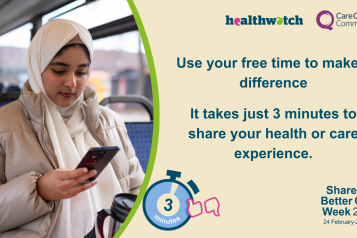What to expect when waiting for care

Updated May 2025
If you or a loved one is waiting for care, read below to find out what healthcare staff should be doing when contacting you.
Communications from healthcare staff should:
Be personalised to you and not just a generic response
When you’re contacted by healthcare staff about your upcoming appointment, they should provide honest information about your next steps. You must be made aware of realistic timescales and what to expect while you wait so that you can make an informed decision about your treatment.
Ease your safety concerns regarding Covid-19
Significant steps have been taken to minimise the risk of Covid-19 transmission while in hospitals. But, if you have any concerns about your safety while in hospital, you should be given contact details to discuss these concerns with a healthcare professional.
Use clear language
When healthcare staff contact you, the language they use should be clear, accessible and easy to understand – whether that’s by letter, email or on the phone. Of course, sometimes technical terms are needed, but these should always be explained to you first.
Share their decision making
You should be part of the conversation when decisions around your health are being made. Healthcare staff should support you to make the right decisions for you and outline the risks and benefits of going ahead with, cancelling or delaying your procedure.
Be clear around delays and cancellations
If you're contacted about a delayed or cancelled appointment, you should be given a clear reason why - and information about what happens next. Healthcare staff must be open and honest with you and give a realistic timescale when you should expect to hear from them again.
Support should be given to help you manage your condition whilst waiting for care. This could be information about or access to other health and care services, or access to pain relief.
Be clear on who to contact if your condition gets worse. Your safety should always be the priority.
If you are waiting for an operation and this gets cancelled for a non-clinical reason on the day you were due for surgery, your hospital should offer you another fixed date within 28 days or fund your treatment at a date and hospital of your choice.
Be accessible, in the format you need
Information around your care must be easy to access and provide you with the option to ask questions. It's essential that you receive information in the way you need it. This can often be via phone. However, other options should be available if you have language or communication needs.
Share your waiting experiences with us
We know that not everyone is getting the help they need while they wait for care. Share your experiences with us so that we can understand what needs to be improved.
Everything you tell us is confidential and will help us and the NHS understand what needs to be put in place to better support people like you.
So whether it’s gynaecological surgery, a knee replacement or a biopsy you’re waiting for, if you’ve got a story to tell, we want to hear it.
My Planned Care
The NHS has launched a new website where you can check the waiting times for NHS hospital treatment in England.
This includes treatment at:
- Addenbrooke's Hospital (listed as Cambridge University Hospital NHS Trust)
- Peterborough City Hospital and Hinchingbrooke Hospital (listed as North West Anglia Trust)
- Royal Papworth Hospital

Getting support whilst you wait
Here are a few organisations that should be able to help:
Local groups
Care Network
Provides information and practical support to help people aged 18+ stay at home and to connect with or support from their local community.
Cambridgeshire, Peterborough and South Lincolnshire Mind
Waiting for treatment can affect your mental health and wellbeing. Mind has information and resources about where to go for support.
Versus Arthritis
Runs an online support group for people in Cambridgeshire with guests such as physios, rheumatology nurses and other healthcare professionals to help you manage your condition.
https://www.versusarthritis.org/get-help
National Support groups
Organisations supporting people living with long-term pain include:
Action on Pain
http://www.action-on-pain.co.uk/
British Pain Society
https://www.britishpainsociety.org/
Pain Concern
Online guides and self help
Mental Health guides and tools - NHS website
https://www.nhs.uk/mental-health/self-help/guides-toolks-and-activtities

